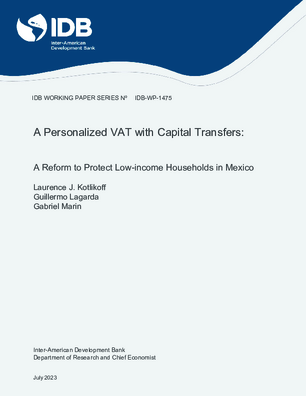A Personalized VAT with Capital Transfers: A Reform to Protect Low-Income Households in Mexico
Date
Jul 2023
The Value-Added Tax (VAT) is the most prevalent consumption tax globally, yet it is frequently deemed highly regressive. To address this, we propose a Personalized VAT (PVAT) devised in conjunction with a distributional policy. We aim to achieve three objectives: increase revenue collection, achieve progressivity, and disrupt the intergenerational dependency of low-income households. We use Mexico as a case study, showing that eliminating all special VAT regimes and standardizing the rate at 16% could contribute an additional 2.2% of GDP to fiscal revenues. However, such a reform could have severe negative welfare impacts on the poor. To tackle this dilemma, we propose several PVAT
scenarios. Our results indicate that a PVAT could be fiscally neutral or even increase revenues by up to 0.83% of GDP, while benefiting the lowest-income households. Lastly, we analyze the general equilibrium effects of a PVAT and various distributional policies, including lump-sum and capital transfers. For this purpose, we employ an overlapping generations model calibrated for Mexico. Our simulations reveal welfare enhancing and output growth results through a PVAT policy that includes capital transfers, thereby presenting a viable strategy for breaking intergenerational dependency.
scenarios. Our results indicate that a PVAT could be fiscally neutral or even increase revenues by up to 0.83% of GDP, while benefiting the lowest-income households. Lastly, we analyze the general equilibrium effects of a PVAT and various distributional policies, including lump-sum and capital transfers. For this purpose, we employ an overlapping generations model calibrated for Mexico. Our simulations reveal welfare enhancing and output growth results through a PVAT policy that includes capital transfers, thereby presenting a viable strategy for breaking intergenerational dependency.




